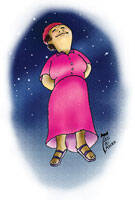Stepping Out on the Word
In her book Wouldn’t Take Nothin’ for My Journey Now, the poet Maya Angelou recalls her grandmother, who raised her in the little town of Stamps, Ark. She describes her as “a tall cinnamon-colored woman with a deep, soft voice,” whose difficult life caused her to rely utterly on the power of God. Angelou envisioned Mamma “standing thousands of feet up in the air on nothing visible,” as she would draw herself up to her full 6 feet, clasp her hands behind her back, look up into a distant sky and declare, “I will step out on the word of God.” Angelou continues: “I could see her flung into space, moons at her feet and stars at her head, comets swirling around her. Naturally it wasn’t difficult for me to have faith. I grew up knowing that the word of God has power.”
In today’s readings, we have similar images of Jesus taken up into the sky, having spent an earthly lifetime stepping out on the word of God, indeed, enfleshing that divine Word. The disciples want to know if now is the time when he is going to restore the kingdom to Israel (Acts 1:6). They have hopes and expectations for the future fixed in past experiences of God’s saving hand in their history. Jesus does not directly answer their question but points them to the power of the Holy Spirit, who will guide them to witness to his Gospel courageously in new situations beyond what they can possibly imagine. As Jesus himself learned in his earthly sojourn, the what of the mission cannot fully be known, but only the Who always with and within those who are willing to trust and to witness to the divine love.
In the Gospel, the turbulence experienced by the followers of Jesus in the time of transition after his death is reflected in the narrative. “The eleven” calls to mind the painful reality that “the Twelve” (10:5) are no more, as one of them betrayed Jesus and then ended his own life (Mt 27:5). Yet the thread of hope is sustained, as the story continues where Jesus’ appearance to the women at the empty tomb left off. Mary Magdalene and the other Mary had seen and worshiped Jesus, and had been commissioned by him to tell the other disciples to go to Galilee, where they would see him (28:9-10). Today’s Gospel presumes that they have fulfilled this directive and the others have believed them, though nagging doubts persist (v. 17).
Another tension is evident in the reference to “eleven disciples.” Disciples comprised a group larger than the Twelve (referred to 73 times in Matthew), among whom were, most notably, the Galilean women who followed and ministered (27:55). While Matthew has depicted the women as apostles who are commissioned in 28:7-10, he excludes them from the commission in today’s Gospel to preach to all the nations. Already tensions regarding women’s witness surface.
Difficult, too, was the shift to a mission that would extend beyond Israel. Until this point in the Gospel, Jesus had insisted that the disciples go only to the “lost sheep of the house of Israel” (10:5; see also 15:24). Now the directive is to go to “all nations.” The troubles stirred up by this new mission were myriad. The question of how law-observant Jewish Christians would be able to eat with gentiles was only the tip of the iceberg. To weather such turbulent transitions, both in those early days of the church and now, the one surety is that Jesus is always with us (28:20 echoes 1:23), as we step out on the word of God in trust.
This article also appeared in print, under the headline “Stepping Out on the Word,” in the May 30, 2011, issue.








